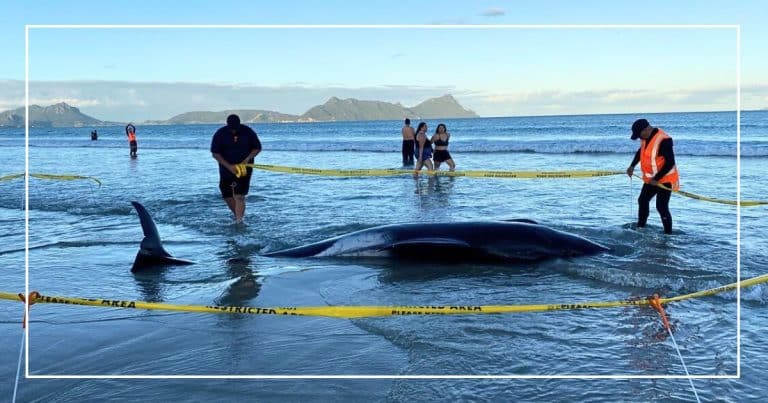
“A world without dolphins or whales isn’t much of a world at all.” – Ric O’Barry
On a Sunday in northern New Zealand, an incredible rescue mission unfolded as over 30 pilot whales stranded on Ruakākā Beach near Whangārei were saved through a unified community effort. The Department of Conservation (DOC) reported that most of the whales were successfully refloated and swam back to the sea. It was all thanks to to the public, authorities and some simple sheets.
The rescue was led by the local Māori group Patuharakeke, joined by conservation authorities and hundreds of members of the public. This collaboration was described as “incredible” by DOC Operations Manager Joel Lauterbach. He said, “It’s amazing to witness the genuine care and compassion people have shown toward these magnificent animals.”

Residents gather to help rescue stranded pilot whales. Photo by New Zealand Department of Conservation
The effort to refloat the whales involved carefully lifting them onto sheets that were rushed to the beach to help. Patuharakeke members stayed on the beach overnight, ensuring that none of the rescued whales re-stranded. Reflecting on the unified response, Lauterbach expressed gratitude to all involved, including Project Jonah, a group dedicated to aiding stranded marine mammals. He added, “This response demonstrates the deep connection we all share with our marine environment.”
The event underscored the mystery surrounding whale strandings, which are a natural phenomenon. New Zealand experiences some of the highest rates of strandings globally, with DOC responding to an average of 85 incidents each year. While many involve single animals, mass strandings, like this one, often puzzle scientists. The country’s coastal geography — marked by shallow, sloping beaches — is believed to contribute to the phenomenon, as it can confuse the echolocation of species like pilot whales.

Residents watch as the stranded pilot whales swim away. Photo by New Zealand Department of Conservation
A poignant moment came on Monday when a cultural ceremony was held by Patuharakeke to honor the whales that died. Whales hold special significance for the Indigenous Māori people, who regard them as a “taonga,” or sacred treasure.
Lauterbach’s words captured the spirit of the rescue: “It’s amazing to witness the genuine care and compassion people have shown toward these magnificent animals.” The event not only highlighted the dedication of those involved but also served as a reminder of the profound connection between humans and marine life.
Pilot whales are considered a larger species of dolphins. Individual pilot whales can end up measuring between 19 and 25 feet in length, often weighing between 2,900 and 5,000 pounds, the National Oceanic and Atmospheric Administration (NOAA) said. Their lifespan, NOAA went on to say, can range from 35 to 60 years. Sadly, they noted, their survival has been becoming increasingly more in danger due to disease, chemical contaminants as well as getting tangled in fishing lines. Even ocean noise, NOAA said, puts them at risk.


